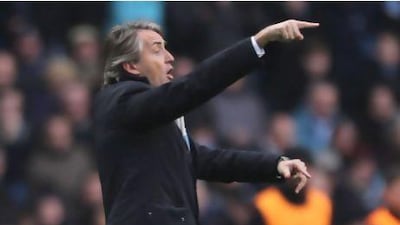On a late March night in 1994, Roberto Mancini and Gianfranco Zola came as close as they would ever get to being teammates.
Italy were playing Germany in the lead-up to 1994 World Cup. Shortly before half time, Mancini made an alert run to combine in a short corner routine with Roberto Donadoni. It led to the game's opening goal. By the interval, though, Germany had equalised.
Ten minutes later, Mancini's international career was over.
It would be a while before the extent of the player's disillusion with the coaching of Arrigo Sacchi became plain, but Mancini had long believed Sacchi's system did not make the best use of his skills.
The crowd in Stuttgart that night included a number of Azzurri supporters who had travelled north.
As the teams kicked off for the second half, they greeted the name of one of the Italy substitutes, introduced at the interval, with loud cheers: Zola, the little man with the big heart and imagination, was popular well beyond the Parma where he was playing his club football, still cherished by the Napoli fans who had seen him win a rare scudetto, Serie A title, with the southern club.
Zola had replaced Mancini. The two men, whose paths will cross again today in the FA Cup, with Mancini managing the English champions Manchester City and Zola in charge of Championship club Watford, have much in common.
They are near contemporaries, Mancini just 20 months older than Zola. They both belonged, as players, firmly in the Italian tradition of the inventive, clever inside-forward.
As trequartistas, they seemed too similar in the eyes of some. The recent history of the national team is full of agonised debates about the extent to which footballers with the gift of individual wizardry can be appreciated and indulged.
For the best part of a decade, the compatibility in the same Italy XIs of the Roma's Francesco Totti and the Juventus legend Alex Del Piero animated discussions.
Mancini's bad luck, when he was in his heyday with Sampdoria, was that Roberto Baggio was flowering in a similar role.
Zola encountered the Baggio barrier, too, in his Italy career, as well as the competition posed by a young Del Piero.
Mancini and Zola also had one another in the way when Italy squads were selected in the early 1990s. Mancini's 36 caps over a decade seem scant given his dynamism and what had been identified from a very young age as "a good football brain".
Zola, who played 35 times for his country, but never with Mancini, also had a high football IQ, his instincts sharpened by the knowledge, as a talented boy growing up in Sardinia, that because of his short stature, he needed subtle means of beating defenders.
"He had what we in Italy call explosive force, quickness off the mark, in abundance," said Gianluca Vialli, Zola's manager and colleague at Chelsea. As for Mancini, Vialli's striking partner and close friend at Sampdoria, Vialli says: "He was always a bit of a prodigy."
Just as Zola won the league with a Napoli who had risen to disrupt the usual Serie A hierarchy, Mancini won a title with Sampdoria. Neither man ever took the usual gilded route of stars, to AC Milan, Juventus or Inter Milan.
For Italy, Mancini watched the 1990 World Cup mainly from the bench. Zola went to the next World Cup at Mancini's expense, but would be sent off - a rarity for this gentlemanly player - in a last-16 game against Nigeria.
Zola, certainly, found more extended pleasure in English football than he had in Italy. His endurance first as a Chelsea player, then with Cagliari, until just short of his 39th birthday, bore witness to his enthusiasm for the game. Mancini also had some Indian summers, winning a second championship, with Lazio, at 35.
As managers, both had tough initiations, Mancini with a Lazio and a Fiorentina suffering hard economic downsizing, Zola in a battle against relegation from the Premier League in his first full season in charge of West Ham United.
As coincidence would have it, Zola's last match in that post was against Mancini's City.
That day, the pair exchanged cordial greetings, but tepid congratulations. City had just finished the Premier League campaign one place off qualifying for the Uefa Champions League; West Ham had finished one spot above the drop.
Today their paths intersect again, in new guises: a Watford manager with reasonable aspirations to climb out of the Championship, a City boss showing symptoms of the strain of being distant second-placers in the Premier League, and already ousted from Europe's principal competition. The FA Cup feels important for both.
Follow us


